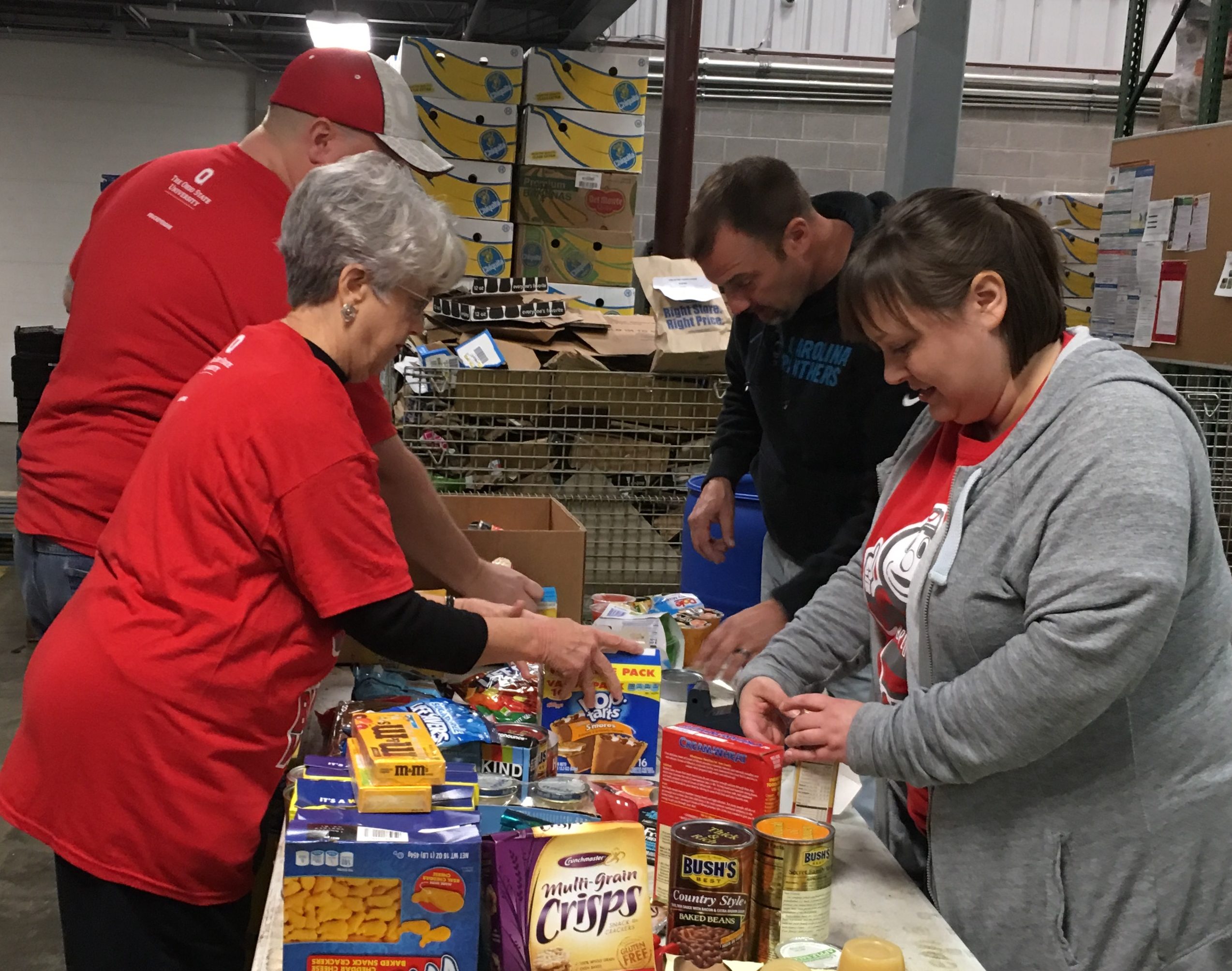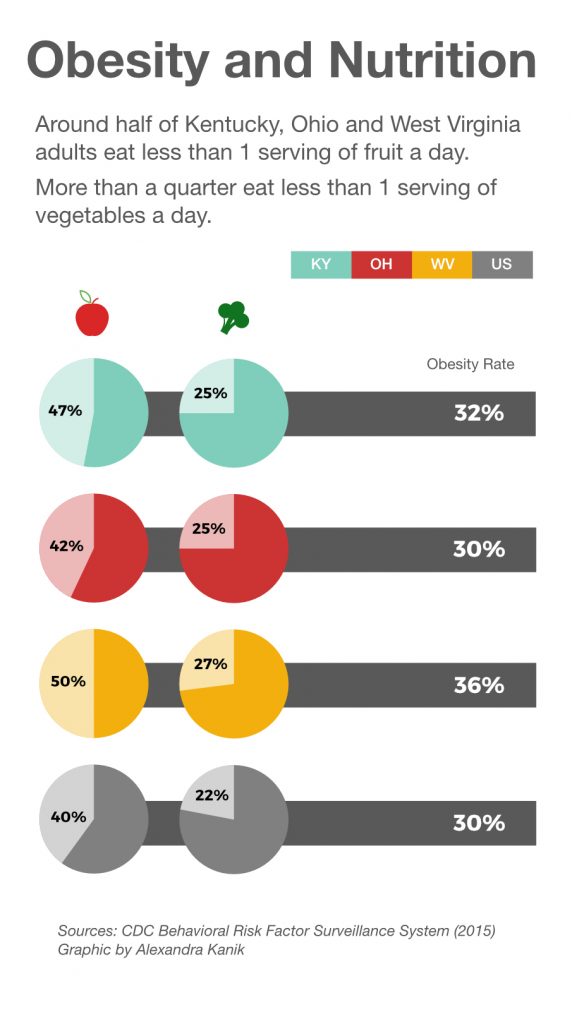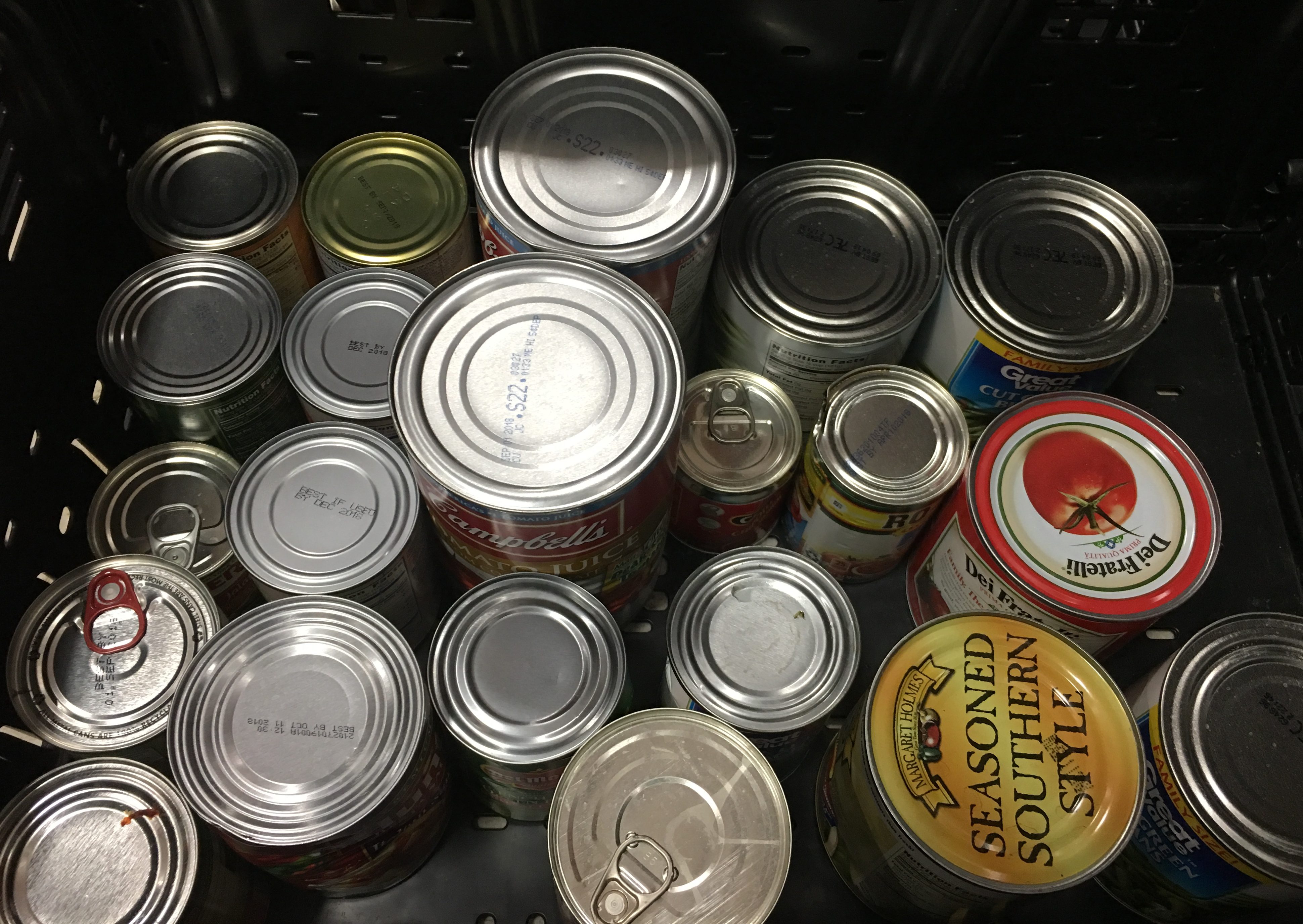News
Hunger Gains: Budget Cuts Imperil Nutritious Food Aid
By: Mary Meehan | Ohio Valley ReSource
Posted on:
At a moment when food aid agencies are working to provide healthier food to the poor and the elderly, President Donald Trump has proposed a 21 percent cut in funding for the agriculture programs that support them.
It’s a move that advocates say is bad for people who need food and local farmers who provide it.
Food Insecurity
To understand why folks are worried is to understand Appalachia’s dependence on food programs. Research at West Virginia University found 15 percent of people there are food insecure. A study in Athens, Ohio, showed half of the families enrolled in Head Start couldn’t count on regular meals. And in Kentucky, where one fourth of children in poverty cope with hunger. God’s Pantry Program Director Danielle Bozarth struggles to keep up. She said it’s unclear what specific food-related programs might be hurt by budget cuts.

Volunteers sort donations at Lexington-based God’s Pantry.
“Just dealing with the uncertainty of not knowing what is going to happen is kind of scary,” she said. She plans to meet with Kentucky Congressman Andy Barr soon to get some clarity on what God’s Pantry might be facing.
God’s Pantry provides food to 50 counties in central and eastern Kentucky. Its program to provide fruits and vegetables to senior citizens is one of the largest in the United States.
 Alexandra Kanik | Ohio Valley ReSource
Alexandra Kanik | Ohio Valley ReSourceDevelopment Director Rebecca Wallace said transportation costs take up much of her budget and God’s Pantry depends on a steady stream of volunteers to get the food packed for delivery.
Ric Roberts and a team of red-shirted members of the Bluegrass Buckeyes sort donated items at God’s Pantry’s massive Lexington warehouse. The fans and alumni of Ohio State University check expiration dates on baby food, stretch tape to repair packing and discuss the nuances of sorting food stuffs.
“Excuse me, what do you classify pickles as, condiment or vegetable?” he said, holding up a jar for examination.
The pickles go in the bin marked “extras” for bonus food, such as candy or barbecue sauce.
Traditionally, most donated foods were non-perishable items with a long shelf life. But Wallace said it’s especially galling that food programs are coming under threat at a moment when they are evolving to provide better nutrition. That means providing people with more fruits and vegetables.
“This year we will distribute right about 32 million pounds of food. That’s a lot of food,” she said. “When you think about how much food we are putting onto the tables of low income families, it also tells us we have an awesome responsibility to make sure that we’re not simply filling bellies but that we are nourishing bodies.”
Farm Fresh
The 2014 the federal farm bill included the Food Insecurity Nutrition Incentive, or FINI. Through grants it links local farmers to food stamp recipients. In Kentucky the program is called Double Dollars: Spend $10 in food stamps on healthy food and you get a $10 voucher to double the buying power.
Andrea Maus, whose infant daughter, Sabali, was bundled up against the wind, used the program for the first time on a brisk weekend at the Berea Farmers Market. She didn’t know about the program at all until she spoke with Farmers Market Manager Margie Seltzer at an information table.

Shaun and Adrian Maus and their child Sabali, got their first Double Dollars at the Berea Farmer’s Market.
“If you are a low income family that doesn’t mean you have to shop at places with cheap and awful produce,” Maus said. With Double Dollars to spend at farmers markets and stores with healthy options, she said, “you can support local food and small businesses and still stay within your budget.”
She ended with a sigh, swayed a bit to calm Sabali, and then finished her thought. Access to healthy foods, she said, is a “right”. She and her husband, Shaun, recently moved to Kentucky and are renting a small farm in nearby Waco, where they hope to grow produce of their own to sell.
Obesity & Hunger
Martina Leforce, of Grow Appalachia, runs the summer feeding program in Berea. She said some people find it difficult to reconcile the region’s high rates of obesity with hunger. But, she said, too much weight can be a sign of malnutrition. People dependent on fast food, or cheap, calorie-dense food like chips or soda, aren’t getting proper nutrition. They get more calories than they need but they are the wrong kind for healthy living.
 Alexandra Kanik | Ohio Valley ReSource
Alexandra Kanik | Ohio Valley ReSourceIn fact, she said, Berea College is holding a conference on the nutrition and food insecurity later this month to explore issues surrounding nutrition and food insecurity.
Such meetings are part of a growing movement. Ashton Wright, Lexington’s Food Coordinator, is leading the effort to take Kentucky’s Double Dollars statewide. It is an effort made possible through a $1 million matching grant. The same thing is happening in Ohio and research for a similar program is underway in West Virginia.
Growing Support
“What’s so exciting about these Double Dollars programs is that it’s not only encouraging folks to eat and make those health behavior changes, it is also directly supporting our local food and farm economy,” Wright said. “So it is directly putting dollars into the pockets of farmers who often times are struggling”
At the Berea Farmers Market Seltzer meets with a constant stream of people asking questions, most wanting to know how they can get their products into the market or asking about Double Dollars. It is a festive atmosphere, with a guy teaching kids to juggle and little ones squealing and playing tag. One boy has subtle rainbow highlights in his brown hair.
Seltzer said cuts in food programs will be bad for local farmers as well as the food recipients.

Goods stored at God’s Pantry’s warehouse in Lexington. which serves 50 counties from central to eastern Kentucky.
A lot of smaller farms, like the ones selling eggs and baked goods at the market, have benefited from Double Dollars. They also operate on very thin margins, so any loss of revenue would be felt acutely. Seltzer said 1 out of every 20 dollars vendors make at the farmers market comes from Double Dollars.
a
“If you believe in the local farm economy, you’ve got to believe in food stamps,” she said.
FINI Finale?
The FINI support expires in 2018, so its future is unclear. A similar program serving the elderly – 12,000 of them in God’s Pantry’s 50 counties alone – is also at risk.
“It’s a very important program,” God’s Pantry’s Wallace said. “So many of the seniors we serve live on minimal income and get $10 a month for food stamps.”
Pantry director Bozarth said there are even questions arising about who will have access to SNAP, the Supplemental Nutrition Assistance Program, which is the largest program in the country’s hunger safety net. Some states, she said, are considering work requirements for people needing food assistance.
Those questions, coupled with the proposed cuts in the Trump budget, have brought a sense of anxiety to many working to feed the low income and elderly. But feedback from Capitol Hill indicates that the food programs may have some powerful friends. Several members of Congress, including the chair of the House Agriculture Committee, have voiced criticism of the White House budget proposal.

